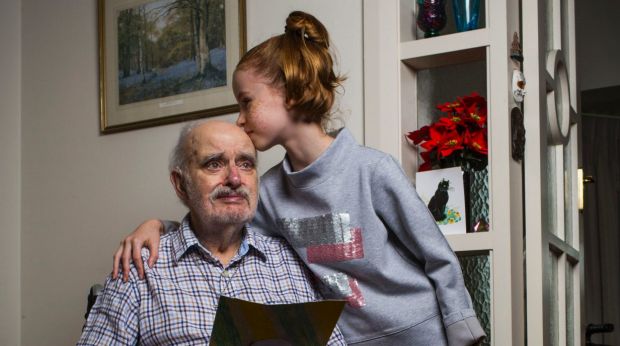A 92-year-old war veteran and great-grandfather who has lived in Australia for 10 years is facing deportation back to Britain after being denied a visa and told he would be a financial burden on the health system.
James Bradley, who served with the British Royal Navy in World War II, has now made a last-ditch plea to Immigration Minister Peter Dutton to intervene and allow him to remain in Australia.
More National News Videos
Great-grandfather facing deportation
He's lived in Australia for the past 10 years, but great-grandfather James Bradley is facing deportation due to health issues. Vision: Ten News
"Considering my background, I think I've been treated shabbily," he said. "I've waited in a queue for permanent residency for 10 years, only to be rejected. I'd like to be able to spend whatever time I've got left here in Australia with my family."
Mr Bradley and his 91-year-old wife Peggie are among 80,000 people waiting for a permanent parent visa – a limbo that can last as long as 30 years, in a system that migration experts say is broken.

When the pair came to Australia in 2007 to join their daughter Sharon, they passed mandatory health checks and were placed in the lengthy queue. Seven years later (and older), they were required to undertake further medical assessments, which Mr Bradley failed.
His limited mobility sees him use a walking frame and he is in the early stages of dementia. A final rejection notice in February 2016 informed the great-grandfather and war veteran he had fallen foul of sub-subparagraph 4005(1)(c)(ii)(A) of Schedule 4 of the Migration Act.
Mr Bradley was assessed to have a condition which would "result in a significant cost to the Australian community in the areas of health care and community services". As they were on a joint ticket, his spouse Peggie was also denied a visa, despite being in good health.
"Although we're old, we do play a part," says Peggie, who collects her nine-year-old granddaughter Karis from school most afternoons. "We can't believe that anyone knowing our history would have grounds for rejecting us."

A spokeswoman for the Department of Immigration and Border Protection confirmed the family's appeal was "being actively considered", but said it was inappropriate to discuss the case in detail.
Ministerial intervention was rare and the minister was not required to explain his decision on any case, she said.

The Aged Parent Visa is available to people over 65 who have a child settled in Australia. The department warns applicants they may be forced to wait up to 30 years due to significant demand and limited places.
At the end of June 2016 there were 50,544 people awaiting a non-contributory parent visa, which costs about $4000, with only 1500 places available. A further 30,000 were in the pipeline for the fast-tracked version, at a cost of about $50,000.

Just 150 of the cheaper Aged Parent Visas were handed out in 2015-16, compared with 450 the previous year, and 590 the year before that.
Migration agent Anna Dobos, of Michelle Porcheron Lawyers, said the system was objective but ineffective. "It doesn't suit any purpose to have people sitting in the queue 20, 30 years," she said.

Dr Dobos said many clients take out loans to pay for the speedier, high-cost visa. But the Bradley family understands that option is no longer available to them.
When Mr Bradley fell ill this week, the nonagenarians discovered their Medicare cards had been frozen. In letters to Mr Dutton, the family has begged for clemency and pointed to Mr Bradley's military service, which they feel has been overlooked.

"Every day, the uncertainty around their immigration status weighs on dad's bent shoulders like the heaviest of invisible sacks," Sharon wrote. "He worries terribly about what will happen to him and to Peggie ... when he is gone. He could not survive deportation."













